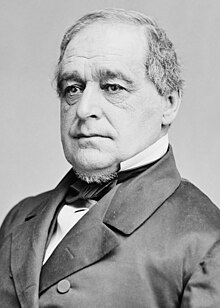Hannibal Hamlin
| Hannibal Hamlin | |
|---|---|
 |
|
| 15th Vice President of the United States | |
|
In office March 4, 1861 – March 4, 1865 |
|
| President | Abraham Lincoln |
| Preceded by | John C. Breckinridge |
| Succeeded by | Andrew Johnson |
|
United States Senator from Maine |
|
|
In office June 8, 1848 – January 7, 1857 |
|
| Preceded by | Wyman B. S. Moor |
| Succeeded by | Amos Nourse |
|
In office March 4, 1857 – January 17, 1861 |
|
| Preceded by | Amos Nourse |
| Succeeded by | Lot M. Morrill |
|
In office March 4, 1869 – March 3, 1881 |
|
| Preceded by | Lot M. Morrill |
| Succeeded by | Eugene Hale |
| 26th Governor of Maine | |
|
In office January 8, 1857 – February 25, 1857 |
|
| Preceded by | Samuel Wells |
| Succeeded by | Joseph H. Williams |
| Member of the U.S. House of Representatives from Maine's 6th district |
|
|
In office March 4, 1843 – March 3, 1847 |
|
| Preceded by | Alfred Marshall |
| Succeeded by | James S. Wiley |
| United States Minister to Spain | |
|
In office June 30, 1881 – October 17, 1882 |
|
| Appointed by | James Garfield |
| President |
James Garfield Chester A. Arthur |
| Preceded by | Lucius Fairchild |
| Succeeded by | John W. Foster |
| Member of the Maine House of Representatives | |
|
In office 1836–1841 1847 |
|
| Personal details | |
| Born |
August 27, 1809 Paris, Massachusetts (now Paris, Maine) |
| Died | July 4, 1891 (aged 81) Bangor, Maine |
| Political party |
Democratic (until 1856) Republican |
| Spouse(s) |
Sarah Jane Emery (m. 1833; her death 1855) Ellen Vesta Emery Hamlin (m. 1856; his death 1891) |
| Religion | Unitarian |
| Signature | |
Hannibal Hamlin (August 27, 1809 – July 4, 1891) was an American attorney and politician from the state of Maine. In a public service career that spanned over 50 years, he is most notable for having served as the 15th Vice President of the United States. The first Republican to hold the office, Hamlin served from 1861 to 1865, during the first term of President Abraham Lincoln.
A native of Paris, Maine, Hamlin was a descendant of an English family that had originally settled in New England in the 1600s. After his early education was complete, Hamlin managed his father's farm before becoming a newspaper editor. He studied law, was admitted to the bar in 1833, and began to practice in Hampden, Maine.
Originally a Democrat, Hamlin began his political career with election to the Maine House of Representatives in 1835 and an appointment to the military staff of the Governor of Maine. As an officer in the militia, he took part in the 1839 negotiations that helped end the Aroostook War. In the 1840s Hamlin was elected and served in the United States House of Representatives. In 1848 the state house elected him to the United States Senate, where he served until January 1857. He served temporarily as governor for six weeks in the beginning of 1857, after which he returned to the Senate.
Hamlin was an active opponent of slavery; he supported the Wilmot Proviso and opposed the Compromise Measures of 1850. In 1854, he strongly opposed passage of the Kansas–Nebraska Act. Hamlin's increasingly anti-slavery views caused him to leave the Democratic Party for the newly formed Republican Party in 1856.
...
Wikipedia
